Sensitive Ghosts
I’m terrified of and fascinated by blindness. On more than one occasion, driving along a stretch of Montanan highway with no cars in sight, I would close my eyes and see how long I could last before my nerves peeled apart and my sight restored itself through sheer reflex. Another time, walking to class, the same experiment caused me to turn my ankle so violently that a moment later I awoke on some very uncomfortable pebble landscaping, pain alight from foot to pelvis, shoe braced tight from the swelling. I’ve since learned better than to flirt with the abyss.
Blindness seems like the perfect target sensation for a genre that so often resorts to flipping cards at random. Yet apart from performative pieces like Nyctophobia, not many games have toyed with the concept of not being able to see what’s right in front of you. At least until Sensor Ghosts, Janice and Stu Turner’s sequel to their first published game, Assembly. Having escaped a contaminated orbital platform, you’re blasting your way back to Earth through a micrometeorite storm. Except the sensors on your ship are throwing up all sorts of noise. The result is profoundly evocative — and more than a little shaky.
Then again, perhaps those are two ways of saying the same thing.
Unlike Nyctophobia, Sensor Ghosts isn’t about closing your eyes. It isn’t even quite like Assembly, which asked its players to police their words and only communicate in snippets, or even shut up entirely and only make rudimentary signs at each other. There are still some sensible limits on communication, mostly there to prevent cooperating pilots from plotting their moves too far in advance, but for the most part Sensor Ghosts plays it straight. Its setup consists of a colorful grid of sensor readings, whether clear space, meteorites small and large, or the occasional science-shrugging “boost.” On one side of this grid lies the entry point; on the other side you can see the Earth, so close yet so infinitely far.
So how does a game that’s wholly visual convey blindness? Surprisingly, the answer was right in front of us the entire time: you flip cards. A lot of cards.
It works like this. Every turn you play a card and take its action. There are some necessary contrivances to consider; for example, if your ship is already on a heading from a previous move, it takes a card from both players to readjust your heading, a useful tidbit of Newtonian physics that forces you to make some hard calls between maintaining a heading and burning delta-v. As in Assembly, seeing the bottom of the draw pile too many times means it’s game over, so every maneuver or thumb-twiddle brings you closer to sucking vacuum.
But it’s what happens when you move onto a card that really matters. Because while you can see what your sensors tell you is there, your sensors aren’t actually functioning very well. As a result, every move flips over its target card right before your ship lands on it. That stretch of open space? There’s a 45% chance it actually houses an asteroid. Taking a risk by flying straight into a massive obstruction? The good news is that you’ve got a two in three chance it’s something else. And before you ask if I went through all the cards to figure out those odds, the rulebook comes with a handy chart for calculating how likely any given step is to kill you.
True, this isn’t proper blindness. It’s closer to a visual migraine, shimmering objects and wavering colors acting as distractions. But the effect is closer to blindness than you might expect. For one thing, the appearance of sure footing is a ruse, a trick, a rumor not to be believed. A boost, one of the purple cards that propels you into the next space, has all the reliability of a ramp that’s frozen over with ice, as liable to slide you safely to the bottom or sending you flipping over the rail into an open trash can. So you pick your way forward. You nudge at everything, prodding for safe passage with your scanners, like sweeping a sidewalk with a white cane for misplaced stones. You move in stutters. Sometimes you dawdle.
That dawdling is because the micrometeorite storm in Sensor Ghosts is constantly moving, calling to mind a crowd in a public space. At the conclusion of each turn, your ship “re-scans,” shifting the row ahead of your ship to the left, with cards that drop out of the grid circling around the other side. This is both a source of annoyance and one of the ways the game is most evocative of visual distortion. On the one hand, it’s another thing to remember in a game that already places a premium on memory, jumbling any immediate dangers and forcing you to plan multiple turns ahead. On the other hand, the same complaint is also a feature. Sometimes your best bet is to remain in place, waiting for a particular window of opportunity to pass your way, while other circumstances will see you darting through safe passage. The trick is that, thanks to a limited hand of cards, your jittery controls might propel you forward at the worst moments.
Really, that’s another way of saying that Sensor Ghosts sometimes wrestles against you for control. Victory requires you to reach Earth after finding a sample of the station-killing virus, often causing you to backtrack or travel along headings you wouldn’t normally hazard. Even trickier, if you’re playing with the escape pod variant, your cards pull double duty, both piloting your ship and directing the titular pod, sometimes in contrasting ways. This is a brilliant little puzzle, placing you in command of two ships on separate vectors and forcing situations where you want to travel in a particular direction but doing so will careen the pod straight into an impact. Meanwhile, it’s also a little bit infuriating. Especially when the game’s intersection of wobbly helmsmanship, ever-shifting storm of threats, and your imperfect memory reach a collision point. Expect to find yourself in plenty of circumstances where you’re holding nothing but cards that will result in your imminent vaporization.
Some of that frustration is due to the way any misstep means death, full-stop. Appropriate, since a grain of sand in space could easily impact with enough force to shred a ship, but also a rather abrupt way to conclude a session. Some mitigating factors make this easier to stomach. Your ship has chargeable shields for negating a single asteroid impact, provided it isn’t a big red one or the edge of the grid. And, of course, there’s the fact that Sensor Ghosts takes maybe fifteen minutes to play. The downside is the involved setup. The aggravation of getting pancaked on your third move is only heightened by the busywork of resetting.
Despite some complaints, Sensor Ghosts succeeds in pitting paralyzing blindness against a countdown that demands motion. Its best moments have been those that asked me to choose between blind groping and committing to a fateful step, between gathering information and acting on probability; such instances bring the entire experience into lurching focus. This is also why Sensor Ghosts is best solo where Assembly was better cooperative. The Turners’ first title was about narrow communication, two minds attempting to exchange information in spite of terrible constraints. By contrast, Sensor Ghosts is about me on a highway in Montana with my eyes closed, a body in a box, blind, hoping to stay the course and keep the velocity level, unsure whether the tires will transmit the hum of the asphalt or the rumble of sleeper lines. Or worse.
In other words, Sensor Ghosts isn’t as elegant as Assembly. Could it have been? Perhaps. But even in its current state — or maybe because of it — it’s unexpectedly vivid, redolent of that dizzying split second when one’s foot fails to connect with the anticipated step. It isn’t a game I’ll return to often, but as a showcase in what a small game can accomplish in spite of its compact size, Sensor Ghosts punches well above its weight.
(If what I’m doing at Space-Biff! is valuable to you in some way, please consider dropping by my Patreon campaign or Ko-fi.)
A complimentary copy was provided.
Posted on May 11, 2020, in Board Game and tagged Alone Time, Board Games, Sensor Ghosts, The Fruits of Kickstarter, Wren Games. Bookmark the permalink. 2 Comments.
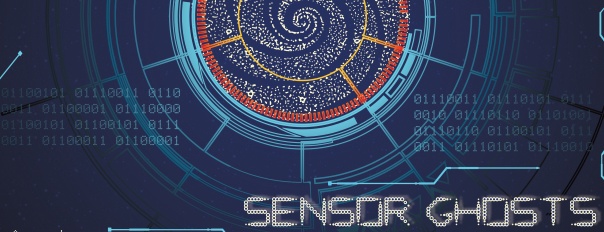
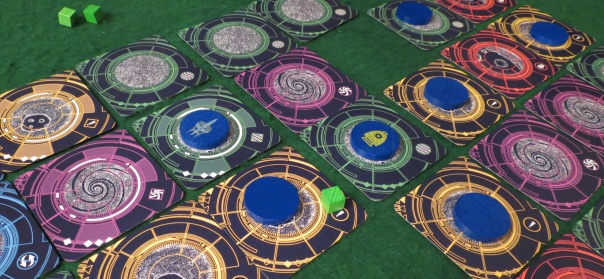
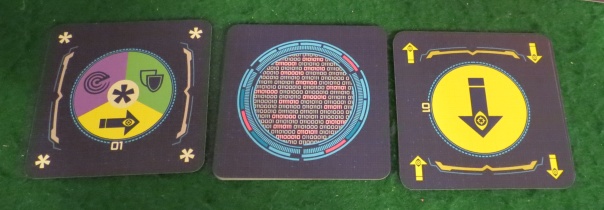
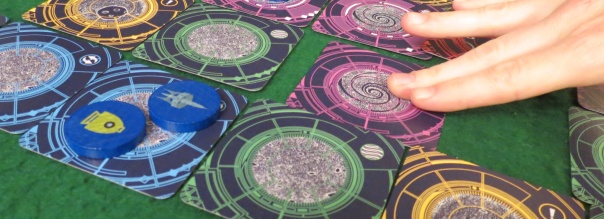
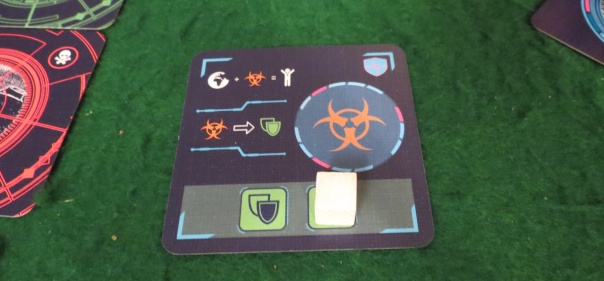
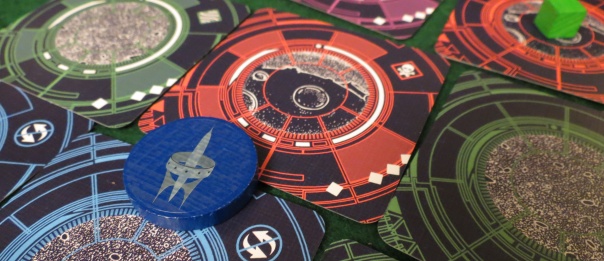
Pingback: Space-Cast! #8. Assembly Ghosts | SPACE-BIFF!
Pingback: Best Week 2020! Agony, Sheer Agony! | SPACE-BIFF!